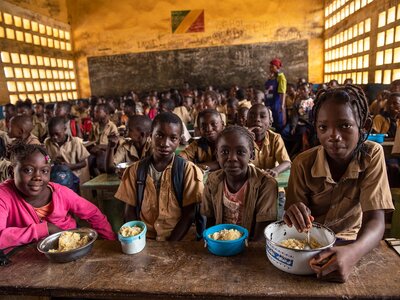Congo
- 33%
- of the population is food insecure
- 32%
- of people live in rural areas
- 6.1 million
- population
The Republic of Congo is a resource-rich country with the potential to achieve Sustainable Development Goal 2 and reach zero hunger by 2030.
However, despite an abundance of natural resources, at least 46.5 percent of the population live below the international poverty line of US$2.15 per day, and hunger and malnutrition are widespread.
One in three people in the Republic of Congo is food insecure. At least 29.3 percent are moderately food insecure, and 4 percent are severely food insecure. Among children under 5, the global acute malnutrition level is 5.2 percent and chronic malnutrition is 19.6 percent.
Food insecurity doubled from 2013 to 2023, due to multiple challenges. Food prices remain high because of persistent fuel shortages and outages.
As an oil-dependent economy, the country is highly vulnerable to fluctuations in global oil prices. Meanwhile, youth unemployment stands at an alarming 42 percent, and fiscal instability – including increasing debt levels – has contributed to a downgrade in the country’s credit rating.
The Republic of Congo hosts around 80,000 refugees, primarily from the Central African Republic and the Democratic Republic of the Congo. Refugees are concentrated in flood-prone areas with limited livelihood opportunities. Up to 300,000 people in the Republic of Congo, including refugees, are affected by flooding each year.
The World Food Programme (WFP) responds to crises and builds long-term resilience in 11 out of 12 departments in the Republic of Congo. WFP’s role is increasingly shifting from operational to advisory, through building government capacity to carry out initiatives.
What the World Food Programme is doing in Congo
-
Crisis response
-
WFP provides food or cash assistance and nutrition support to 108,600 vulnerable people, including refugees, asylum seekers, returnees, local flood-affected populations, acutely malnourished children and women, and people living in urban areas who have been impacted by shocks and crises, including ethnic conflict, political violence and floods. Where appropriate, the assistance is combined with livelihood opportunities like food for assets, in which to receive food, beneficiaries create or rehabilitate assets like roads and infrastructure that enhance the economic resilience of their communities.
-
School meals
-
Building of national capacities
-
Support for smallholder farmers
-
Logistics support
Congo news releases
Go to pageFind out more about the state of food security in Congo
Visit the food security analysis pageOperations in Congo
Contacts
Office
Avenue du Général de Gaulle BP 1036. Brazzaville, Republic of Congo
Brazzaville
Congo - Brazzaville







